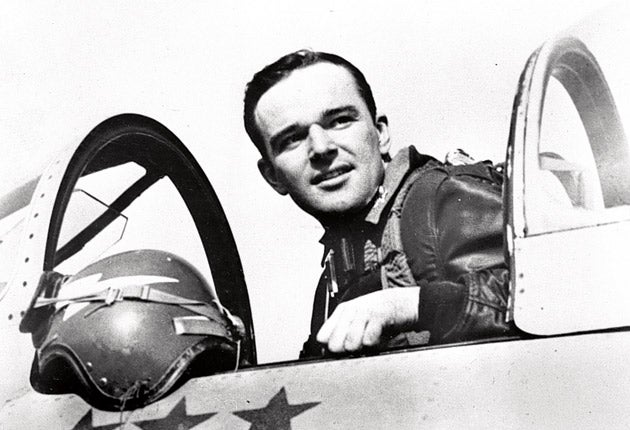Colonel Bud Mahurin: Pilot who shot down enemies over both Europe and the Pacific in the Second World War and was a POW in Korea

Colonel Bud Mah-urin was the only US Air Force pilot to shoot down enemy aircraft in both Europe and the Pacific in the Second World War as well as in the Korean War. More remarkable, however, was his survival, as he was shot down in all three campaigns.
Walker Melville Mahurin, the son of an architect, was born in 1918, in Benton Harbor, Michigan, but grew up in Fort Wayne, Indiana. He attended South Side High School before studying engineering at Purdue University, West Lafayette. It was a good choice, for the university was and is well-known for its science and aviation technology programmes; it was the first university to have its own airport, where Amelia Earhart prepared her plane for her around-the-world flight attempt. And it was there that Mahurin started his flying career.
In September 1941, he enlisted in the Army Air Force as an aviation cadet. After completing training he was on his way to Halesworth in England to join the 63rd Fighter Squadron, 56th Fighter Group. Flying a P-47 Thunderbolt he scored his first aerial victories over Germany on 17 August 1943, shooting down two German fighters, Focke-Wulf Fw 190s, while escorting B-17 bombers. One of these fighters was flown by Major Wilhelm Galland, the famous ace with some 55 claims to his credit.
By October, Mahurin had shot down five enemy aircraft, making him, too, an ace. In the following month, he was recognised as the first American pilot in European operations to have destroyed 10 enemy planes. He became the 56th Fighter Group's first Silver Star recipient.
In March 1944, "Bud", as he was known, shared credit for bringing down a German bomber, but he had to bail out of his heavily damaged plane. A French farmer found him and, risking his life, put him in touch with the French Resistance. Two months later Mahurin was back in England. Precisely because of his experience with the French Resistance, his superiors decided against his remaining in Europe where, if he were to fall into enemy hands, he could endanger French lives. Instead he was given command of the 3rd Fighter Squadron, part of the 3rd Air Commando Group, in the Philippines. Flying a P-51 Mustang he scored his only aerial hit in the Pacific, in January 1945. Once again he was brought down, this time by ground fire. Hours later he was rescued from a life raft.
It looked like the end of his combat career and, he admitted, he had been scared to death to begin with. In spite of this he was ready for action when the Korean War broke out in June 1950. Lieutenant colonel Mahurin exchanged his post in the Office of the Secretary of the Air Force for another combat assignment. He flew over 60 missions and scored 3.5 hits over Korea, flying an F-86 Sabre jet with the 51st Fighter Interceptor Wing.
Once again he was shot down by ground fire, in May 1952, and was lucky to survive. But another ordeal was ahead, as a prisoner of war for 16 months. Due to starvation and ill treatment, mortality rates were 43 per cent. By comparison, "only" 34 per cent of US captives died in Japanese camps. He and his comrades also suffered torture and brainwashing.
The Communists pressured captured airmen to sign confessions that they had been involved with germ warfare on bombing missions. After a failed suicide attempt he was among 36 pilots who finally relented. They wrote "confessions" full of errors and inaccuracies that would be easily spotted by the outside world. Nevertheless, they were attacked by Richard Russell, Jnr, Chairman of the Senate Armed Services Committee.
Shortly after repatriation, in September 1953, Mahurin was appointed vice commander of the 27th Air Division. He retired as a colonel in 1956, four years short of eligibility for retirement benefits. He then worked for North American Aviation in California. His autobiography, Honest John: The Autobiography of Walker M Mahurin, was published in 1962. Among his many awards were the Distinguished Flying Cross (United Kingdom) and the Croix de Guerre with Palm in both France and Belgium.
David Childs
Walker Melville Mahurin, pilot: born Benton Harbor, Michigan, 5 December 1918; married twice (three children); died Newport Beach, California 11 May, 2010
Subscribe to Independent Premium to bookmark this article
Want to bookmark your favourite articles and stories to read or reference later? Start your Independent Premium subscription today.

Join our commenting forum
Join thought-provoking conversations, follow other Independent readers and see their replies